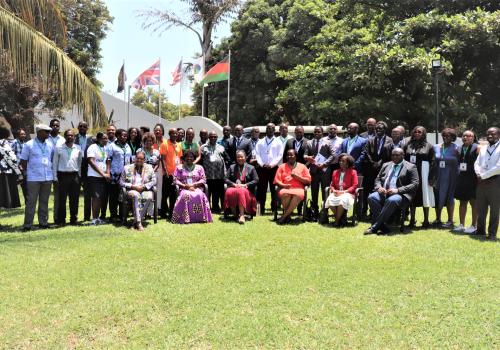Member States of the Southern African Development Community (SADC) have been called upon to recognise and harness the power ofdigenous Knowledge to unlock new opportunities for sustainable development.
The call was made at the opening of the Sixth SADC Regional Policy Workshop on Indigenous Knowledge Systems (IKS) on 29 November 2023 which runs up to 1st December 2023 under theme “Leveraging Indigenous Knowledge Systems in the Agro-processing and Pharmaceutical Value Chains for Industrial Development”.
In her opening remarks, Honourable Madalitso Kambauwa Wirima, Minister of Education of the Republic of Malawi, underscored the importance of IKS for its potential to provide practical solutions to some of the most pressing global issues and fast track the attainment of Sustainable Development Goals (SDGs) adopted by the United Nations in 2015.
“As we stand on the brink of unprecedented global challenges, it is essential that we acknowledge and appreciate the invaluable wealth of IKS that has been cultivated and passed down through generations”, Hon. Wirima said.
She said the IKS, often rooted in traditional practices and local ingenuity, represents a profound connection to the environment and offer an array of solutions that can guide the region towards a more sustainable and harmonious future of SADC Member States.
Ms. Anneline Morgan, Senior Programme Officer for Science, Technology and Innovation at SADC Secretariat stressed the importance of the regional workshop as a platform to promote policy dialogue and sharing of experiences on IKS and facilitate regional cooperation on IKS.
She highlighted the SADC Protocol on Science, Technology and Innovation of 2008 recognises the need to develop, value and promote IKS and technologies.
Mr. Hlalanathi Fundzo, Head of Rural Transformation, AUDA-NEPAD, SADC and WFP Joint Implementation Team at the WFP Southern African Regional Office urged the SADC Member States to combine indigenous knowledge with science to ensure food and nutrition security, paving the way for sustainable development.
He highlighted that the Southern African region presents countless success stories of how indigenous knowledge, combined with scientific advancements, has significantly improved agro-processing and pharmaceutical value chains.
The workshop has brought together various stakeholders, including government representatives from SADC Member States, academia, independent researchers and research organizations, international agencies, indigenous knowledge holders, schools, small and medium enterprises (SMEs), private sector entities, regional and continental institutions, and the media.
During the opening of the workshop, delegates were treated to an array of displays and performances that exemplify how indigenous knowledge and practices have been preserved for generations and combined with modern technologies and methods to support social and economic development.
This 6th SADC IKS workshop is a continuation of the series of the regional IKS policy workshops with the view to map the implementation of the approved IKS policy tools and instruments within the SADC member states. The Workshop aims to produce an updated status on the progress of national IKS Policy development by SADC Member States and foster collaboration among stakeholders for the advancement of Indigenous Knowledge Systems in the region and on the African continent.
#IndegenousKnowledgeSystems

